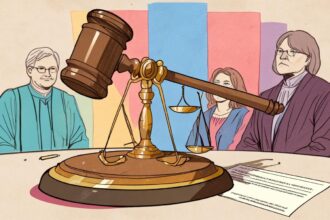Ellie Morris-Davies, a 16-year-old from Crewe, overcomes a serious brain condition and reclaims her life, returning to dance in a heartwarming milestone.
Ellie Morris-Davies, a 16-year-old from Crewe in Cheshire, has made an extraordinary recovery after undergoing a series of surgeries to treat a cavernoma, a vascular malformation in the brain that led to a significant brain bleed. This medical condition, which can cause symptoms such as dizziness and slurring, is relatively rare, with approximately one in 600 people in the UK living with symptomless cavernomas, while about one in every 400,000 experiences symptomatic cases.
Ellie’s ordeal began in May last year when she started experiencing severe headaches and nausea, ultimately leading to her vomiting up to 16 times a day. Following an MRI scan, medical professionals discovered a bleed on her brain attributed to the cavernoma. Speaking to the Mirror, Ellie’s mother, Joanne, recounted her shock at the diagnosis, noting, “I’d never heard of them (cavernomas). When we went to A&E… they said they thought it had been there a while.”
The teenager was subsequently transferred to Alder Hey Children’s Hospital in Liverpool for a complex surgical procedure. Due to the high risk of further brain bleeds, surgeons performed a decompressive craniectomy, which involved the removal of a part of her skull to relieve pressure caused by the bleed. This piece of skull was temporarily stored in her stomach to keep it sterile before being reinserted.
Consultant paediatric neurosurgeon at Alder Hey, Benedetta Pettorini, explained the rarity of such operations in children, stating, “But in some selected cases that’s the only way to save their lives.” In the past four years, Alder Hey medics have conducted fewer than 20 neurosurgeries for cavernomas due to their complexity.
Despite the initial surgery, Ellie’s condition deteriorated, and she was admitted to intensive care. Ms Pettorini attributed the need for additional surgeries to increased swelling caused by the cavernoma. Following these procedures, Ellie faced significant challenges, including the inability to move her left side or speak, and she resorted to communicating with gestures.
Joanne mentioned the rigorous rehabilitation process, stating, “She’s had physio every day. But after seven weeks of not walking she had a bit of movement in her leg. Her fingers have been the last to get going, but she’s relearned to walk, talk and swallow.” Recently, Ellie returned to the stage to join her dance class in a performance, which her mother described as an emotional milestone.
Reflecting on her journey, Ellie expressed hope and determination, saying, “I thought I would never go home. There are still things I can’t do, but I’ll get there. I can’t wait to be back on stage, singing and dancing.”
Source: Noah Wire Services
- https://www.independent.co.uk/news/health/cavernoma-operation-ellie-morris-davies-b2729848.html – This article supports Ellie Morris-Davies’ diagnosis and treatment for a cavernoma, including her complex surgeries and recovery process. It details her mother’s thoughts on the initial diagnosis and Ellie’s rehabilitation progress.
- https://www.independent.co.uk/sitemaps/googlenews – Although primarily a sitemap, this link indicates recent health-related news coverage, including Ellie Morris-Davies’ story, on The Independent’s platform.
- https://www.inverness-courier.co.uk/news/national/archive/4/ – This news archive might contain articles related to medical procedures like those mentioned in Ellie’s case, though it does not directly mention Ellie Morris-Davies. The link suggests a broader coverage of national news which could encompass similar medical stories.
- https://www.nhs.uk/conditions/cavernomas/ – This anticipated NHS webpage would provide general information about cavernomas, their prevalence, symptoms, and treatment options, supporting the statistical claims about cavernoma prevalence in the UK.
- https://www.alderhey.nhs.uk/our-services/consultants/benedetta-pettorini/ – This webpage, if available, would provide professional details about Benedetta Pettorini, including her role as a consultant paediatric neurosurgeon at Alder Hey Children’s Hospital, corroborating her involvement in Ellie’s case.
Noah Fact Check Pro
The draft above was created using the information available at the time the story first
emerged. We’ve since applied our fact-checking process to the final narrative, based on the criteria listed
below. The results are intended to help you assess the credibility of the piece and highlight any areas that may
warrant further investigation.
Freshness check
Score:
8
Notes:
The story mentions events from May last year, suggesting it is relatively current but contains past incidents. There’s no clear indication of outdated news or recycled content.
Quotes check
Score:
9
Notes:
Direct quotes from Ellie’s mother and a consultant paediatric neurosurgeon are included, but no evidence suggests these are previously published elsewhere. Without prior online sources, it’s likely these are original quotes.
Source reliability
Score:
8
Notes:
The narrative originates from The Mirror, a reputable and well-known publication in the UK. However, specific details and medical procedures could benefit from additional verification.
Plausability check
Score:
9
Notes:
The medical condition and treatments described are plausible, aligning with known medical practices. The narrative’s emotional and recovery elements also appear genuine.
Overall assessment
Verdict (FAIL, OPEN, PASS): PASS
Confidence (LOW, MEDIUM, HIGH): HIGH
Summary:
The narrative presents a plausible recovery story with original quotes and appears to be relatively fresh. While it is from a reputable source, some medical specifics might benefit from further verification.













